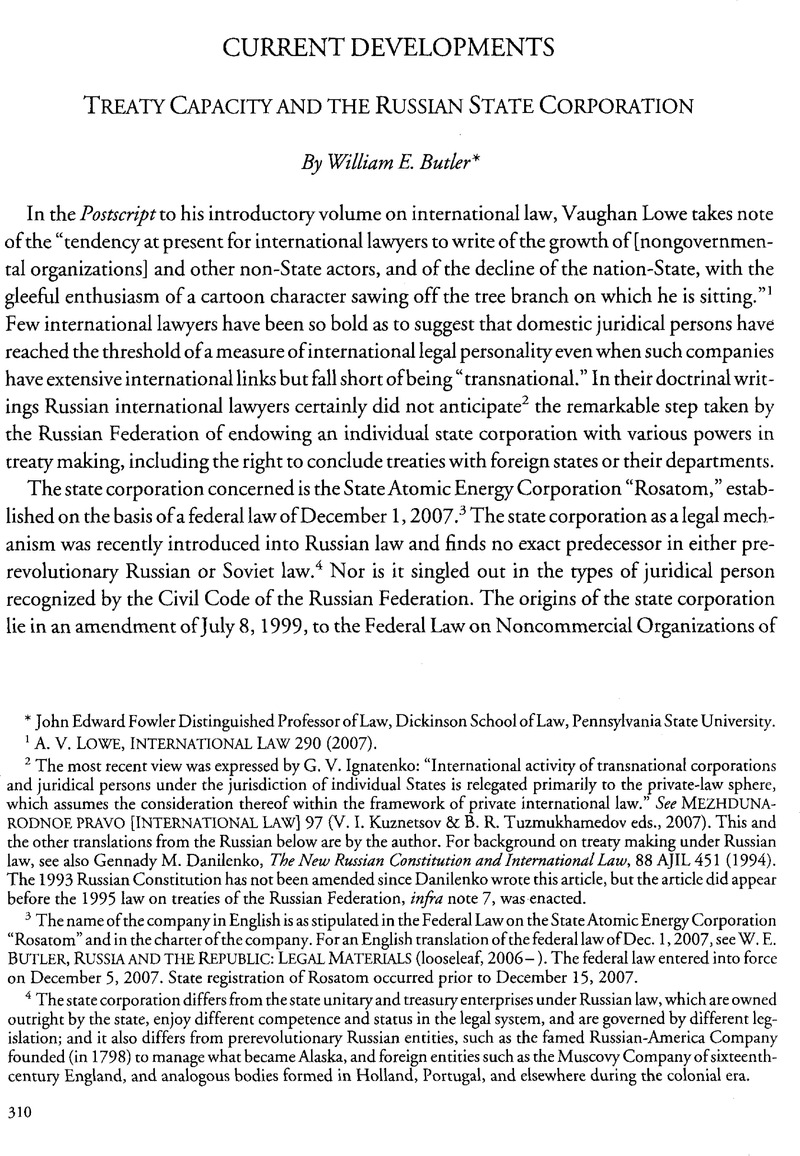Published online by Cambridge University Press: 27 February 2017

1 A. V. Lowe, International Law 290 (2007).
2 The most recent view was expressed by G. V. Ignatenko: “International activity of transnational corporations and juridical persons under the jurisdiction of individual States is relegated primarily to the private–law sphere, which assumes the consideration thereof within the framework of private international law.” See Mezhdunarodnoe, Pravo [International Law] 97 Google Scholar ( Kuznetsov, V. I. & Tuzmukhamedov, B. R. eds., 2007)Google Scholar. This and the other translations from the Russian below are by the author. For background on treaty making under Russian law, see also Gennady, M. Danilenko, The New Russian Constitution and International Law , 88 AJIL 451 (1994)Google Scholar. The 1993 Russian Constitution has not been amended since Danilenko wrote this article, but the article did appear before the 1995 law on treaties of the Russian Federation, infra note 7, was enacted.
3 The name of the company in English is as stipulated in the Federal Law on the State Atomic Energy Corporation “Rosatom” and in the charter of the company. For an English translation of the federal law of Dec. 1, 2007, see W. E. Butler, Russia and The Republic: Legal Materials (looseleaf, 2006–). The federal law entered into force on December 5, 2007. State registration of Rosatom occurred prior to December 15, 2007.
4 The state corporation differs from the state unitary and treasury enterprises under Russian law, which are owned outright by the state, enjoy different competence and status in the legal system, and are governed by different legislation; and it also differs from prerevolutionary Russian entities, such as the famed Russian–America Company founded (in 1798) to manage what became Alaska, and foreign entities such as the Muscovy Company of sixteenthcentury England, and analogous bodies formed in Holland, Portugal, and elsewhere during the colonial era.
5 Federal Law on Noncommercial Organizations, Jan. 12, 1996, Art. 71. For an English version, see W. E. Butler, Russian Company and Commercial Law 605 (2003); and as amended, see Butler, supra note 3.
6 Though created, it was not destined to survive for long. The agency was abolished by a federal law of July 28, 2004; it had no international functions or linkages.
7 My translation of the Federal Law on International Treaties, June 16, 1995, appears, inter alia, in 24 ILM 1370 (1995)Google Scholar; Butler, W. E., The Russian Law Of Treaties (1997), reviewed in 92 AJIL 356 (1998) (Gennady, M. Danilenko)Google Scholar; William, E. Butler, The Law Of Treaties In Russia And The Commonwealth Of Independent States 5 (2002) (with commentary) [hereinafter Butler, Russia and Commonwealth], reviewed in 98 AJIL 631 (2004)Google Scholar ( Peter, Krug); National Treaty Law and Practice 567 (Duncan, B. Hollis, Merritt, R. Blakeslee, & Benjamin Ederington, L. eds., 2005)Google Scholar. For the Federal Law on International Treaties as amended in 2007, see Butler, supra note 3 [hereinafter Amended 1995 Law].
8 Amended 1995 Law, supra note 7, Art. 2(a).
9 Id., Art. 2(i).
10 Law on the Procedure for the Conclusion, Performance, and Denunciation of International Treaties, July 6, 1978, 17 ILM 1115 (1978)Google Scholar; Butler, Russia and Commonwealth, supra note 7, at 218.
11 The laws of treaties of the USSR and all twelve independent states of the former Soviet Union appear in Butler, Russia and Commonwealth, supra note 7.
12 The 1993 Constitution is translated in William, E. Butler, Russian Public Law 7 (2005)Google Scholar; Butler, supra note 3.
13 Amended 1995 Law, supra note 7, Art. 4.
14 Id., Art. 6(2).
15 Id., Art. 8(2).
16 Id., Art. 9. The terminology here is crucial. Apparently, a state corporation that sees the need for this may make a “proposal” for the conclusion of a treaty, that is, exercise the right of treaty initiative, but is excluded from internal policy discussions concerning treaty recommendations that do not amount to a full right of treaty initiative.
17 Id., Art. 11(3).
18 Id., Art. 12(3).
19 Id., Art. 13(c).
20 Id., Art. 16(2).
21 Id., Art. 20(3).
22 Id., Art. 28.
23 Id., Art. 30.
24 For recent case law and discussion, see Zimnenko, B. L., International Law And The Russian Legal System 208–27 (Butler, W. E. trans., 2007)Google Scholar.
25 Amended 1995 Law, supra note 7, Arts. 32, 33.
26 Id., Art. 36(1).
27 Id., Art. 37(5), (7).
28 Id., Art. 39(2).
29 Draft Articles on Jurisdictional Immunities of States and Their Property, in International Law Commission, Report on the Work of Its Forty–third Session, UN GAOR, 46th Sess., Supp. No. 10, pt. 2, at 13, UN Doc. A/46/10 (Pan 2) (1991).
30 United Nations Convention on Jurisdictional Immunities of States and Their Property, Dec. 2, 2004, 44 ILM 803 (2005)Google Scholar.
31 See Bykhovskaya, E. A., State Immunity In Russian Perspective (2008)Google Scholar.